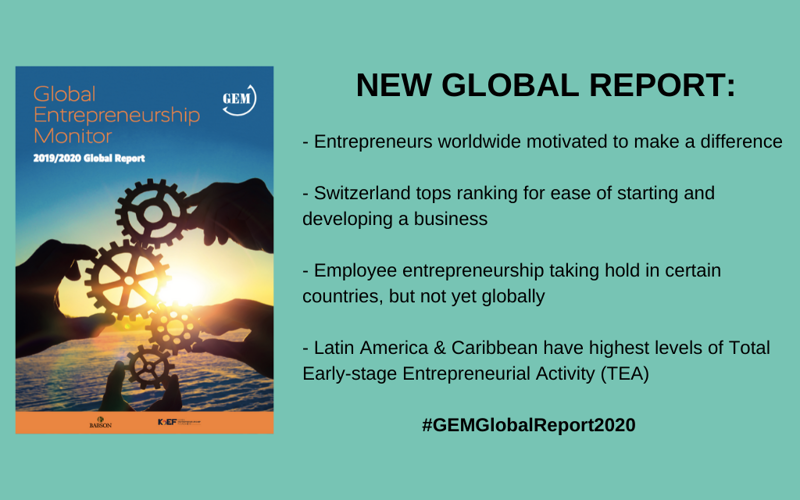03 mars 2020
More than 40% of entrepreneurs in 35 of 50 countries agree or strongly agree that their motivations to launch a business are to make a difference in the world, according to the Global Entrepreneurship Monitor’s (GEM) latest Global Report. Switzerland tops for ease of starting and developing a business.

Many companies have put a priority on pursuing purpose in recent years. This finding indicates that so too are entrepreneurs. There were stark differences across countries: India, South Africa and Guatemala had the highest percentage of entrepreneurs whose motivations are to make a difference in the world. Fifty economies participated in the GEM 2019 Adult Population Survey (APS) and more than 150,000 individuals took part in extended interviews as part of the research.
The GEM results confirmed that accumulating financial wealth is also an important motivating factor. More than eight out of ten of those starting a new business in Iran, Qatar, Pakistan, India and Italy indicated that building great wealth or income has motivated them. This compares to less than two in ten in Norway or Poland.
Women starting a business are more likely to agree with the motivation of making a difference to the world. Men starting a business are more likely to agree with the motives of building great wealth or high income, or of continuing a family tradition.
The motivations of entrepreneurs may also be indicative of disruption or job insecurity in many economies. In 35 of the 50 economies, over half of adults starting a new business agree with the motive “to earn a living because jobs are scarce”. Women were also more likely than men to agree that earning a living because jobs are scarce is an important motivation.
Switzerland tops for ease of starting and developing a business
Last year GEM introduced the National Entrepreneurship Context Index (NECI), a measure of the ease of starting and developing a business. In the latest report, Switzerland topped these rankings among the 54 countries involved in the study, followed closely by the Netherlands, Qatar, China and the United Arab Emirates.
Data from NECI was derived from the 2019 GEM National Expert Survey (NES) in which national experts are asked to assess the national environment for entrepreneurship in terms of 12 GEM-defined framework conditions. Physical Infrastructure is universally rated the most well-developed of the framework conditions that support entrepreneurship. Entrepreneurship Education at the school-level is universally regarded as the least developed, weakest condition.
“This is testament to the investment done by Swiss cities and cantons, positive media coverage about entrepreneurship in the country, and an increase in corporate entrepreneurship,” said Rico J. Baldegger, Director and Professor of Strategy, Entrepreneurship and Innovation at the School of Management Fribourg (HEG-FR). “Many companies are investing in start-ups and this is making a difference. We also have a high level of diversity - culture, languages and disciplines, etc. - and this has been an important factor driving entrepreneurship.”
Global Entrepreneurship Monitor (GEM)
Global Entrepreneurship Monitor (GEM) is a consortium of national country teams, primarily associated with top academic institutions, that carries out survey-based research on entrepreneurship around the world. GEM is the only global research source that collects data on entrepreneurship directly from individual entrepreneurs!
The Swiss chapter of the GEM study is led by the School of Management Fribourg (HEG-FR) in collaboration with other colleges such as SUPSI Manno in Ticino.